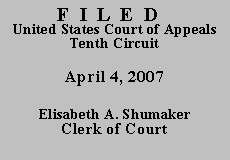

| SEAN BERNAT; HENRY T. ZAKHARIAN; DARRIN MANN; JEREMY REDFORD KEE; JOSEPH SCOVELL; DONALD G. LANG; DYLAN T. SERRE, | No. 06-4183
(D.C. No. 1:05-CV-155-TS) (District of Utah) |
Petitioners in this consolidated case all pled guilty to, inter alia, alcohol- or drug-related driving misdemeanors in justice court and appealed to district court. On appeal, Petitioners argued that Utah's two-tiered court system violates their federal double jeopardy, due process, and equal protection rights. Specifically, Petitioners argued that (1) Utah's failure to vacate automatically Petitioners' convictions pending their appeal violates their double jeopardy rights; (2) Utah's requirement that Petitioners must convince the justice or district court, through applications for certificates of probable cause, to grant stays pending their appeal trenches upon their due process rights; and (3) their guilty status pending appeal in district court contravenes their equal protection guarantees. Petitioners unsuccessfully litigated their claims through the Utah Supreme Court and the United States Supreme Court.
Petitioners then collaterally challenged, under 28 U.S.C. § 2254, their Utah misdemeanor convictions in the United States District Court for the District of Utah, again raising claims of violations of their double jeopardy, due process, and equal protection rights. The district court issued a detailed, 25-page opinion, denying Petitioners' requested relief. The district court found that the Utah Supreme Court's decision on Petitioners' claims did not "result[] in a decision that was contrary to, or involved an unreasonable application of, clearly established Federal law, as established by the Supreme Court of the United States," 28 U.S.C. § 2254(d)(1), because (1) the Supreme Court has never addressed the specific issue presented regarding double jeopardy in this case and Utah law entitled Petitioners to an appeal de novo, see Mem. & Order at 19-22; (2) Petitioners' applications for certificates of probable cause only pertain to the district court's granting of a stay of conviction pending their de novo appeal not the right to appeal itself, see id. at 22-23; and (3) Utah's law granting de novo actually treats Petitioners more favorably as it gives Petitioners a second chance to relitigate arguments from justice court in district court, see id. at 24. Petitioners now seek to appeal the district court's ruling.
Congress has instructed, however, that we may review a district court's denial of a Section 2254 petition only if a judge first issues a certificate of appealability ("COA"); in turn, such a certificate may be issued only if the petitioner has "made a substantial showing of the denial of a constitutional right." See 28 U.S.C. § 2253(c)(2). Under our rules, a habeas petitioner must present the COA issue, in the first instance, to the district court. Because the district court did not address the COA issue, our rules deem it denied. See 10th Cir. R. 22.1(c). Petitioners failed to file with us an application for a COA; we therefore treat the notice of appeal as an application for a COA. See Fed. R. App. P. 22(b).
Based on our own independent review of the record in this case and for substantially the same reasons outlined in the district court's opinion on Petitioners' Section 2254 petitions, summarized above, we believe that Petitioners have not met the threshold set by Congress for the issuance of a COA. Accordingly, Petitioners' COA is denied and this appeal is dismissed.
ENTERED FOR THE COURT
Neil M. Gorsuch
Circuit Judge
*.This order is not binding precedent except under the doctrines of law of the case, res judicata and collateral estoppel. It may be cited, however, for its persuasive value consistent with Fed. R. App. P. 32.1 and 10th Cir. R. 32.1.